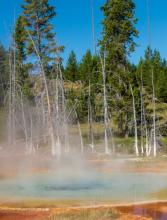FrackSA: A tool to aid in the enforcement of groundwater regulations during unconventional oil and gas extraction
South Africa is currently considering unconventional oil and gas (UOG) extraction as an additional energy resource to improve the country’s energy security. In a water-scarce country such as South Africa, which has experienced more frequent and more intense climate extremes due to climate change, the water-related impacts of UOG extraction is a concern. The South African government is however determined to proceed with UOG development as soon as regulations to protect natural resources have been drafted.
